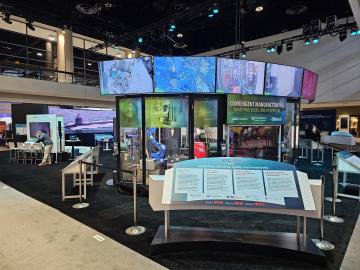
Filter News
Area of Research
- Advanced Manufacturing (22)
- Biology and Environment (18)
- Building Technologies (4)
- Computer Science (1)
- Electricity and Smart Grid (1)
- Energy Frontier Research Centers (1)
- Energy Science (178)
- Functional Materials for Energy (1)
- Fusion and Fission (7)
- Fusion Energy (1)
- Materials (75)
- Materials for Computing (13)
- National Security (6)
- Neutron Science (20)
- Nuclear Science and Technology (4)
- Quantum information Science (1)
- Supercomputing (23)
- Transportation Systems (2)
News Topics
- (-) 3-D Printing/Advanced Manufacturing (146)
- (-) Buildings (74)
- (-) Nanotechnology (64)
- (-) Transportation (103)
- Advanced Reactors (40)
- Artificial Intelligence (131)
- Big Data (79)
- Bioenergy (112)
- Biology (128)
- Biomedical (73)
- Biotechnology (39)
- Chemical Sciences (86)
- Clean Water (33)
- Composites (35)
- Computer Science (226)
- Coronavirus (48)
- Critical Materials (29)
- Cybersecurity (35)
- Education (5)
- Element Discovery (1)
- Emergency (4)
- Energy Storage (114)
- Environment (218)
- Exascale Computing (67)
- Fossil Energy (8)
- Frontier (64)
- Fusion (66)
- Grid (74)
- High-Performance Computing (130)
- Hydropower (12)
- Irradiation (3)
- Isotopes (62)
- ITER (9)
- Machine Learning (68)
- Materials (157)
- Materials Science (158)
- Mathematics (12)
- Mercury (12)
- Microelectronics (4)
- Microscopy (56)
- Molten Salt (10)
- National Security (86)
- Neutron Science (171)
- Nuclear Energy (122)
- Partnerships (68)
- Physics (69)
- Polymers (35)
- Quantum Computing (53)
- Quantum Science (92)
- Security (31)
- Simulation (65)
- Software (1)
- Space Exploration (26)
- Statistics (4)
- Summit (71)
Media Contacts

ORNL researchers were honored with a prestigious ACE Award for Composites Excellence by the American Composites Manufacturers Association. The team won the “innovation in green composites design” prize for creating a fully recyclable, lightweight wind turbine blade tip that incorporates low-cost carbon fiber and conductive coating for enhanced protection against lightning strikes.

Researchers at ORNL are using advanced manufacturing techniques to revitalize the domestic production of very large metal parts that weigh at least 10,000 pounds each and are necessary for a variety of industries, including energy.

Justin West, an advanced machining and machine tool researcher at ORNL, has been selected as a recipient of the 2024 30 Under 30 award by the Society of Manufacturing Engineers.

Stephen Kowalski and Mikael Salonvaara received the Distinguished Service Award, which salutes members who have served the society with distinction in chapter, regional and society activities.

Three transportation researchers at the Department of Energy’s Oak Ridge National Laboratory have been elevated to senior member grade of the Institute of Electrical and Electronics Engineers, or IEEE.

Kashif Nawaz, distinguished researcher and section head for Building Technologies Research at the Department of Energy’s Oak Ridge National Laboratory, has been named a Fellow of the American Society of Mechanical Engineers, or ASME.

Katy Bradford is on a mission to revolutionize the construction industry and is the founder of Cassette Construction, a company in the newest cohort of Innovation Crossroads, a DOE Lab-Embedded Entrepreneurship Program node at ORNL. As an Innovation Crossroads fellow, Bradford and her company will receive technical, financial and networking support to successfully advance the company’s products to the marketplace.

A new convergent manufacturing platform, developed in only five months at the Department of Energy’s Oak Ridge National Laboratory, is debuting at the International Manufacturing Technology Show, or IMTS, in Chicago, Sept. 9–12, 2024.

ORNL has partnered with Western Michigan University to advance intelligent road infrastructure through the development of new chip-enabled raised pavement markers. These innovative markers transmit lane-keeping information to passing vehicles, enhancing safety and enabling smarter driving in all weather conditions.

A team led by scientists at ORNL identified and demonstrated a method to process a plant-based material called nanocellulose that reduced energy needs by a whopping 21%, using simulations on the lab’s supercomputers and follow-on analysis.


